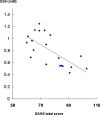Negative correlation between brain glutathione level and negative symptoms in schizophrenia: a 3T 1H-MRS study
- PMID: 18398470
- PMCID: PMC2275307
- DOI: 10.1371/journal.pone.0001944
Negative correlation between brain glutathione level and negative symptoms in schizophrenia: a 3T 1H-MRS study
Abstract
Background: Glutathione (GSH), a major intracellular antioxidant, plays a role in NMDA receptor-mediated neurotransmission, which is involved in the pathophysiology of schizophrenia. In the present study, we aimed to investigate whether GSH levels are altered in the posterior medial frontal cortex of schizophrenic patients. Furthermore, we examined correlations between GSH levels and clinical variables in patients.
Methods and findings: Twenty schizophrenia patients and 16 age- and gender-matched normal controls were enrolled to examine the levels of GSH in the posterior medial frontal cortex by using 3T SIGNA EXCITE (1)H-MRS with the spectral editing technique, MEGA-PRESS. Clinical variables of patients were assessed by the Global Assessment of Functioning (GAF), Scale for the Assessment of Negative Symptoms (SANS), Brief Psychiatric Rating Scale (BPRS), Drug-Induced Extra-Pyramidal Symptoms Scale (DIEPSS), and five cognitive performance tests (Word Fluency Test, Stroop Test, Trail Making Test, Wisconsin Card Sorting Test and Digit Span Distractibility Test). Levels of GSH in the posterior medial frontal cortex of schizophrenic patients were not different from those of normal controls. However, we found a significant negative correlation between GSH levels and the severity of negative symptoms (SANS total score and negative symptom subscore on BPRS) in patients. There were no correlations between brain GSH levels and scores on any cognitive performance test except Trail Making Test part A.
Conclusion: These results suggest that GSH levels in the posterior medial frontal cortex may be related to negative symptoms in schizophrenic patients. Therefore, agents that increase GSH levels in the brain could be potential therapeutic drugs for negative symptoms in schizophrenia.
Conflict of interest statement
Figures


References
-
- Mahadik SP, Mukherjee S. Free radical pathology and antioxidant defense in schizophrenia: A review. Schizophr Res. 1996;19:1–17. - PubMed
-
- Yao JK, Reddy RD, van Kammen DP. Oxidative damage and schizophrenia: An overview of the evidence and its therapeutic implications. CNS Drugs. 2001;15:287–310. - PubMed
-
- Abdalla DS, Monteiro HP, Oliveira JA, Bechara EJ. Activities of superoxide dismutase and glutathione peroxidase in schizophrenic and manic-depressive patients. Clin Chem. 1986;32:805–807. - PubMed
-
- Ben Othmen L, Mechri A, Fendri C, Bost M, Chazot G, et al. Altered antioxidant defense system in clinically stable patients with schizophrenia and their unafected siblings. Progress in Neuro-Psychopharmacology & Biological Psychiatry. 2008;32:155–159. - PubMed
-
- Zhang XY, Tan YL, Zhou DF, Cao LY, Wu GY, et al. Disrupted antioxidant enzyme activity and elevated lipid peroxidation products in schizophrenic patients with tardive dyskinesia. J Clin Psychiatry. 2007;68:754–760. - PubMed
Publication types
MeSH terms
Substances
LinkOut - more resources
Full Text Sources
Medical

